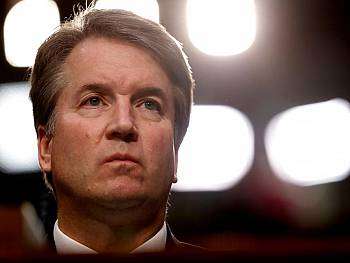The Volokh Conspiracy
Mostly law professors | Sometimes contrarian | Often libertarian | Always independent
Partisan Bias, Motivated Reasoning, and the Debate Over the Kavanaugh Nomination
The debate over the sexual assault accusations against Brett Kavanaugh is a striking example of partisan bias at work.

One of the most striking aspects of the debate over the sexual assault accusations against Supreme Court nominee Brett Kavanaugh is the extremely high correlation between what people think of the allegations and whether they believe Kavanaugh should be confirmed aside from them. Conservatives Republicans who like Kavanaugh's jurisprudence tend to dismiss the accusations. Liberal Democrats who oppose Kavanaugh on jurisprudential grounds tend to think the accusations are true (or at least highly likely to be so). A similar pattern emerges when it comes to the issue of burden of proof, with conservatives often claiming that it rests on the accuser and that Kavanaugh is "innocent until proven guilty," like a defendant in a criminal trial. Liberals, by contrast, tend to argue that the situation should be treated as more a "job interview" than a legal process, and it is up to Kavanaugh to prove that he is fit to be a Supreme Court justice. Some even contend that we should presumptively believe the accusers.
This seems to me an obvious sign of motivated reasoning driven by polarization and ideological and partisan bias. As a matter of logic it should be possible to believe that Kavanaugh could be a terrible judge, yet also innocent of sexual assault. Similarly, nothing necessarily precludes a nominee from simultaneously being a great jurist and a sexual predator. Good legal reasoning is not a guarantee of virtue in other aspects of life. Yet, at least in the world of legal and political commentary, there are very few if any exponents of either of these positions. The same pattern holds true for the issue of burden of proof. It is logically possible to believe that the burden of proof in cases where a judicial nominee is accused of sexual assault should rest with the accuser, while also believing that Kavanaugh is an awful jurist. Similarly, there is no contradiction in thinking that Kavanaugh's jurisprudence is laudable, while also endorsing the "job interview" approach to burdens of proof. Yet pundits who hold either of these two combinations of views are harder to find than albino elephants. That is very telling.
People on both sides of the Kavanaugh debate may wish to ask themselves whether ideology or partisanship are influencing their evaluation of evidence on factual and procedural questions that are at most only indirectly related to the political and jurisprudential stakes in the nomination. Many studies show that people often engage in "motivated reasoning" on political issues—twisting facts and logic to fit their ideological and partisan preconceptions.
This kind of bias can influence our views on almost any question on which we have strong feelings. But it is especially likely on political issues, where most people have very little incentive to curb their biases and seek out the truth. If you come to falsely believe that a friend, relative, or co-worker is guilty of sexual abuse, your poor judgment may have great costs for you. Ditto if you make such a mistake in the other direction. If a pundit, activist, or ordinary voter misjudges Brett Kavanaugh, he or she is unlikely to pay much of a price for failure. Indeed, he may even be lauded by fellow partisans for standing up for their cause. That is even more likely to occur in an era of extreme polarization and growing partisan hatred.
I do not claim to be immune to such biases myself. Far from it. But it is perhaps easier for me to try to avoid them in this case, because, as a libertarian, I strongly dislike both major parties—even more so at this time than I usually do. As for Judge Kavanaugh, I like many aspects of his jurisprudence, but have significant reservations on his views on executive power. It is not clear to me whether I would be happier (on jurisprudential grounds alone) with him or with whoever Trump might pick next, should this nomination fail. It may well depend on exactly who Trump chooses. Lack of investment in the cause makes it easier to avoid having it influence my judgment.
I believe there should be a more thorough investigation of the various accusations. At this point, I find it hard to say whether they are likely to be true or not. I also think it's very possible that even the best feasible investigation will still leave us with little more knowledge of what happened than we have now. More tentatively, I think the burden of proof should be roughly even between the two sides.
Be that as it may, we would be wise to consider the possibility that the facts about the accusations may not line up with our political and jurisprudential commitments as nicely as we might prefer. The first step towards overcoming our biases is to recognize that they exist.


Show Comments (386)